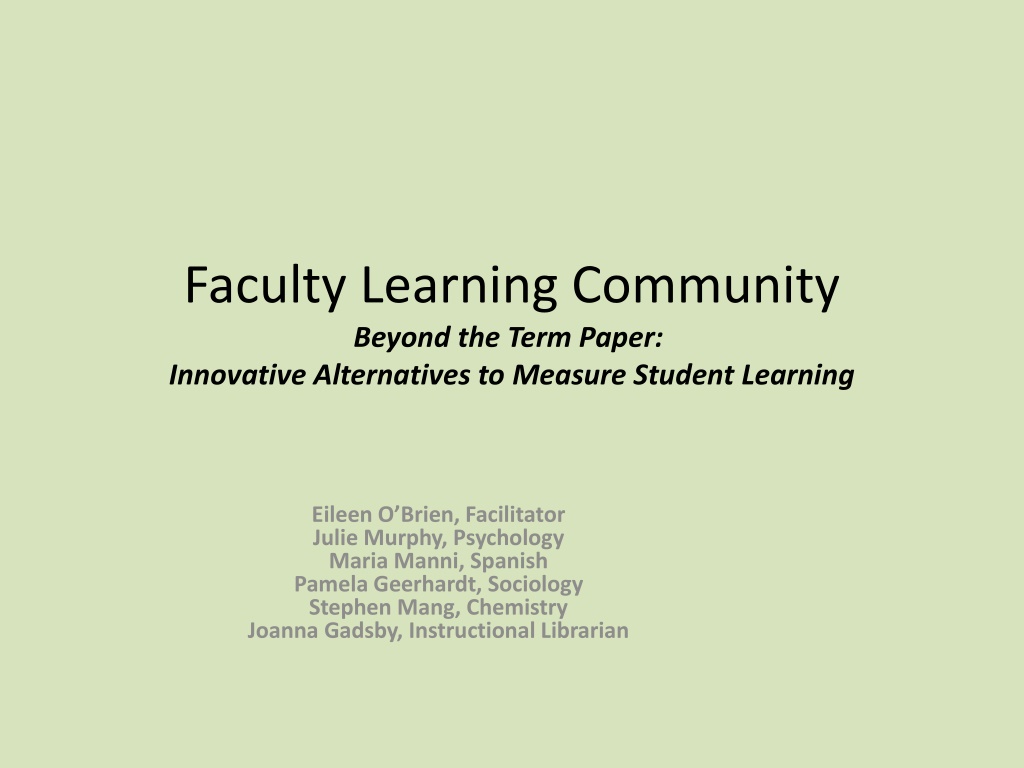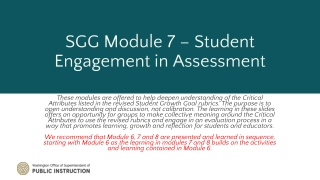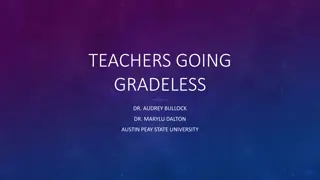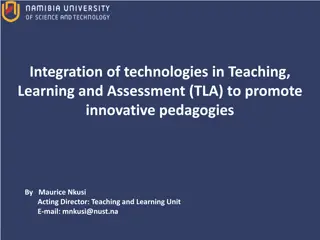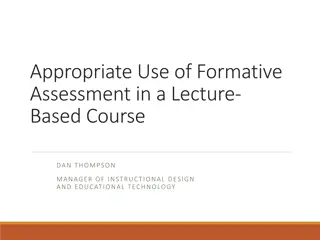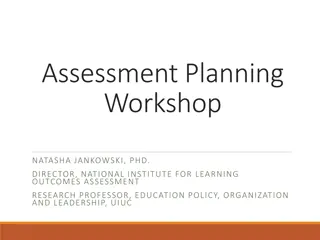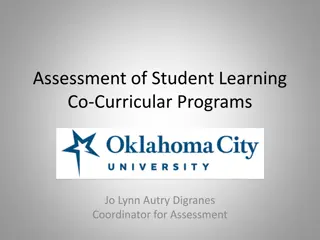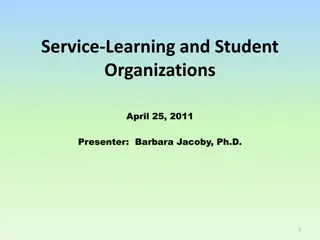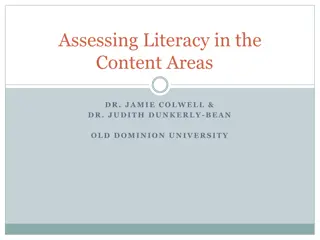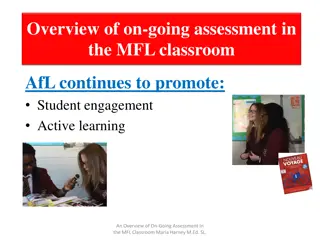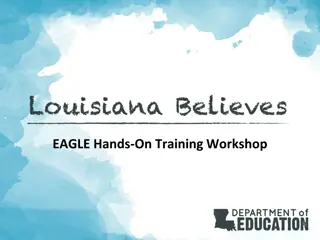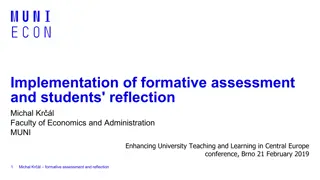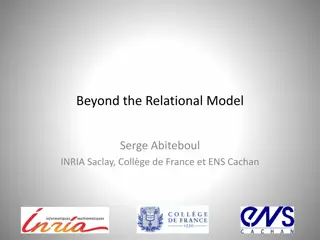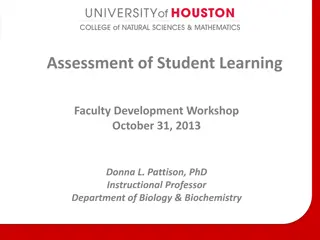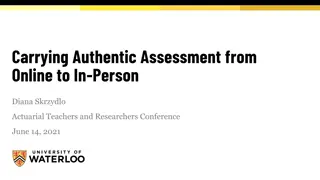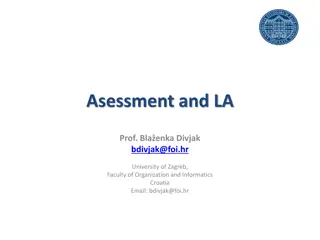Innovative Assessment Strategies for Student Learning Beyond Traditional Methods
Exploring alternative assessment methods in academia, this collection showcases innovative approaches adopted by various faculty members to evaluate student learning beyond traditional term papers. Professors from diverse disciplines have implemented creative solutions such as using radio stories to assess research critique skills in psychology, introducing intermediate assignments in chemistry labs to enhance data analysis and writing practices, and redesigning project assessments in library courses. These innovative strategies aim to enhance student engagement, critical thinking, and overall learning outcomes across different subjects.
Download Presentation

Please find below an Image/Link to download the presentation.
The content on the website is provided AS IS for your information and personal use only. It may not be sold, licensed, or shared on other websites without obtaining consent from the author. Download presentation by click this link. If you encounter any issues during the download, it is possible that the publisher has removed the file from their server.
E N D
Presentation Transcript
Faculty Learning Community Beyond the Term Paper: Innovative Alternatives to Measure Student Learning Eileen O Brien, Facilitator Julie Murphy, Psychology Maria Manni, Spanish Pamela Geerhardt, Sociology Stephen Mang, Chemistry Joanna Gadsby, Instructional Librarian
Radio Story Assignment Julie Murphy, Psychology Problem: New course that will have very little TA support but 300-400 students per year ( 80/section) Needed an assignment to assess student ability to consume and critique/analyze psychological research A writing assignment demonstrating these skills for each student too daunting Facilitated Solution: Radio Story Feedback built in at every phase (but not always from prof/TA) Research article choice & team assignment Headline that is captivating but also accurate ( focus group feedback) Script writing (both individual and team-based aspects) Recording rough draft for feedback Recording & editing final story (UMBC Media Library) Uploading to UMBCTube Additional FLC-facilitated developments: Will be using plagiarism certification/accountability process for my WI class Will be using metacognitive feedback form across all classes involving writing assignments
Chemistry 300 Lab Assignment Stephen Mang, Chemistry Problem: No satisfactory way of assessing student writing for a group project in chemistry lab No satisfactory way of evaluating data presentation as part of the written assignment Students not completing a rough draft, just diving into writing the lab assignment Facilitated Solution: Intermediate individual assignments Will provide examples of good graphing practices prior to the assignment Provide intermediate deadlines to force rough draft writing Specifically provide a description page for an intermediate, individual assignment Build in a self-assessment rubric that is a required part of their assignment process The same rubric will be used for their lab submission Additional FLC-facilitated developments: Will develop a more formal self-assessment as part of the project-assessment next semester
Literature review outline Joanna Gadsby, Instructional Librarian Problem: A project for the eight-week course on library skills and processes embedded in McNair Scholars required research methods course Students end goal for the course is a research proposal including a review of the literature Students were not able to make the leap from an annotated bibliography to literature review Feedback for the annotated bib was a checklist that gave limited quality feedback to the students Facilitated Solution: Literature Review Outline Changing from an annotated bib assignment to a Literature Review Outline Building time in the course for peer review of literature review outline Developing a rubric to guide students submissions Providing more qualitative remarks using the rubric for feedback clarity Additional FLC-facilitated developments: Will be adding metacognitive assessment to the feedback process
Contemporary Deviance Assignment Pamela Monaghan-Geernaert Problem: Develop a project for a course that allows students to use contemporary media to exam deviant behavior. Students were un-motivated to write term papers regarding deviance, but enjoyed lively classroom discussion. Students needed to use critical thinking skills and apply theoretical overview to deviant behavior Facilitated Solution: Multi-Media Presentation Changing from a term paper to a critical review and analysis of media Allowing students to use media sources (videos, blogs, animation) to highlight deviant behavior Developing a rubric to guide students submissions with a focus on directly linking media to theories of deviance Providing a more contemporary approach to examining deviant behavior Additional FLC-facilitated developments: Collegial support and review of alternative assessment
Formative Writing Assessment in a Hybrid Class Maria Manni, MLLI, Spanish Problem: Writing assignments used as summative assessment Little evidence of students reflection on corrections and feedback No data collection to analyze students self assessment of writing skills and the effectiveness of the assessments No opportunity to compare and contrast students vs. Instructor assessment of writing skills Facilitated Solution: Create rubrics for incremental assignments Development of a reflective survey to guide students in using metacognitive strategies Collect data on students metacognitive reflections using an online analytical tool to examine perceived effectiveness. Identified rubrics to be used as tools to identify variation between students self assessment and instructor s assessment. Additional FLC-facilitated developments: Learned about software that can be used to facilitate the task of providing feedback for writing assignments Became aware of resources available for incorporation of media and visual arts databases.
Writing Intensive Incremental Assignment Eileen O Brien, Facilitator Problem: Formative assignment with three writing submissions: outline and draft submission to provide feedback, then a final paper. Common writing errors and formatting issues (25 students, 20 page paper.) Students not responding to editorial comments and editing becomes laborious Final papers limited in assessing students response to feedback. Facilitated Solution: Software and metacognitive assessment Customize CE Annotate Pro software to use in Psychology Build in common editing feedback comments and update links for additional help that students can access Adapt a current rubric that assess students understanding of editorial feedback Incorporate a sentence outline and thesis statement as the first assignment Additional FLC-facilitated developments: As a facilitator I was able to acquire multiple opportunities for consultation across disciplines Learned about a rubric to assess metacognition
Faculty Learning Community The Flipped Classroom Eric Anderson, Physics Lili Cui, Physics Tomoko Hoogenboom, MLLI Anne Bengochea, MLLI Kal Nanes, Math Rich Wilson, Philosophy Tiffany Gierasch, Chemistry Sarah Leupen, Biology
Tomoko Hoogenboom JPNS 201 (Third semester of Japanese) Goal: Use classroom hours for speaking practice Training students for life-long learning Students activities; Go through uploaded new grammar patterns slides with video before class Take quiz (including content of the slides) and do pair work in class Mark can-do sheet (list of items that they are able to do with the new grammar patterns)
Flipping CHEM 351 in Summer CHEM 351 (Organic Chemistry I) already has been flipped during fall/spring Before class = read & complete assignment In class = concept development & problem-solving After class = continued practice & assessment Advantages in summer better classroom space not lecturing for hours at a time Challenges in summer students must digest bigger chunks of information on their own what level of accountability is appropriate?
John Schumacher, Sociology & Anthropology Sociology 600 Research Methods Graduate introduction to social research including research conceptualization, design, measurement, analysis, and presentation of results. Plans redesign based on a range of active learning methods including: 1) Team-based learning approaches; 2) Problem- based learning activities Techniques include the use of : Problems/Case studies for teams; Engagement of community partners; Virtual office hours (Blackboard Collaborate); Drawing and recording software ( Notability software for Ipad).
Flipped classroom in French 102 Goal : flipping practice to facilitate the transferability of new lexical and grammatical material in staged real-life situations in-class. Flipped training should be applied to three essential language skills : vocabulary, grammar, culture Vocabulary : online drills and quizzes Taking multiple-choice quizzes to memorize the spelling of new words doing matching activities to grasp correct definitions written in French completing paragraphs mixing spelling and meaning as final assessments Grammar : problem solving approach reading text-book and powerpoint presentation about the grammar point in case to grasp general theory watching short videos in which the instructor illustrates the point with visual and audio examples taking online right-wrong questions or multiple choice quizzes in English to bring about observation and analysis of the new concept and draw conclusions Culture : online research to elaborate comparisons and sustain in-class debate doing web research and taking notes about a cultural point to be presented and compared in a pros-cons -type debate.
Flipping Physiology 5-min orienting video before class Reading quiz at beginning of every class (or Reading Response for papers) Team-based problem-solving & primary literature analysis in class Compare techniques in 2 sections? Role of team quiz?
Problem: Pre-reading interferes with intuition and prior knowledge Solution: Weekly learning cycle Fri (30 min): Introduce topic in class via demonstration/class discussion, establishing need to invent new concepts Fri (20 min): Quiz Read the chapter, online objective reading quiz Mon (50 min): Explore and apply new concepts to qualitative questions, connect with prior knowledge and intuition, introduce quantitative problem solving Complete online homework Begin online homework: qualitative reasoning and problem solving Wed (50 min): Problem solving practice Anderson, Flipping the Classroom
Teaching Anticipatory Ethics Richard L. Wilson Philosophy A set of questions are given to students to address before watching a video clip. Students watch the clip before class and address the questions previously presented to them. Classroom time is devoted to a discussion of the deeper ethical and social issues related to the content of the video clip.
SPAN311: Poetic Images Collage Erin Hogan Assistant Professor of Spanish What: Visualize poetic images How: Google Presentation Objectives: Close reading of poem with dictionary Identify the images, form, tone of the poem Choose the images that best suit the tone of the poem and treat each slide as a stanza Present as a review for the poetry quiz MLLI
TESOL program. Students design and develop an instructional plan to address a real-life problem or need in an area related to TESOL. Students must be able to effectively present their proposal to potential clients or employers. For our new online section, students will present their projects via at least two of the following tools/media. o presentation software o screencast o video o website o videoconferencing o other tool/medium approved by the instructor Students should select presentation methods appropriate for the type of instruction/training, content, and intended audience. EDUC 794: Project Seminar is a capstone course for the MA outside of the course to promote the projects they have developed. It is hoped that students will be able to use their presentations Mary Tabaa
Larkey: German 319 German Translation: Subtitling Exercise Subtitling a 5-Minute Segment of the German TV Series Stromberg An adaptation of the UK TV Series The Office Translate into English Placement of subtitle in frame Correct color and length of subtitle
Alonso: FLC Project: Creating Video Assignments for PSYC 415 Goal: To allow students to creatively express their knowledge of a concept in Cognitive Psychology (based on APA s Noba Contest) Process: Students worked either independently or in groups and used some form of video to convey one of the following 3 concepts: (1) Memory (Encoding, Storage, Retrieval), (2) Factors Influencing Learning, (3) Forgetting and Amnesia Evaluation Criteria: Students were evaluated in terms of: (1) Accuracy, (2) Originality, (3) Clarity (Visual and Auditory), (4) The ability to effectively teach or demonstrate the chosen focus in a memorable way, (5) Organization and form Outcome: A positive experience but there were lessons learned!
Wagner: imovies in BIOL 123 Human Genetics for non majors Students chose a human genetic disease on which to perform literature research and make an imovie to disseminate that information to their classmates in a 5-8 minute movie. Very successful from my point of view students did a great job of concisely summarizing their diseases in some really creative ways. Much more interesting than powerpoint presentations! One improvement for next year give more time in class for groups to work on project (3 days instead of 1.5 days)
21st Century Literacies: Developing and Implementing Digital Assignments SPAN 202: Intermediate Spanish 2 Milvia Hernandez Digital Assignment 2: Digital Assignment 1: Students will choose a topic to create a digital story that it has been interested in related topics covered in the course. One of the objectives for this digital assignment is creativity, and appreciation of the language and culture. This is an individual project, and it will be presented to the class. Mi experiencia y mi futuro con el espa ol (My experience and future with the Spanish) Students will create a digital story in which they will narrate their experience learning Spanish. Moreover, students will end their story with their future plan of the language in their professional careers. This is an individual project, and it will be presented to the class. For both digital assignments, students will be graded based on rubrics.
Oscoz: SPAN 10: Create a group page in Facebook Setting: Hybrid summer class 6 weeks Two face-to-face meetings + virtual environment Goals: To create a community of language learners To promote communication among class members To practice linguistic structures presented in the class Each week learners: Post three entries related to the topic seen in class (e.g., likes and dislikes, daily activities) Comment on two other classmates postings Like two other classmates postings Evaluation Content and accuracy of post 1% extra for the persons with more likes and comment
Drabinski: GWST 200: Studies in Feminist Activism Collaborative Activist Blog http://umbcactivism.wordpress.com/ Self Designed Activist Projects - A Living Journal and a Tool for Reflection Blog as an Online Archive of Student Activist Work Blog as a Resource for Future Versions of the Course (A Community of Knowledge and Practice) Potential Data for Future Scholarship of Teaching and Learning on Teaching Activism Inside Institutions
